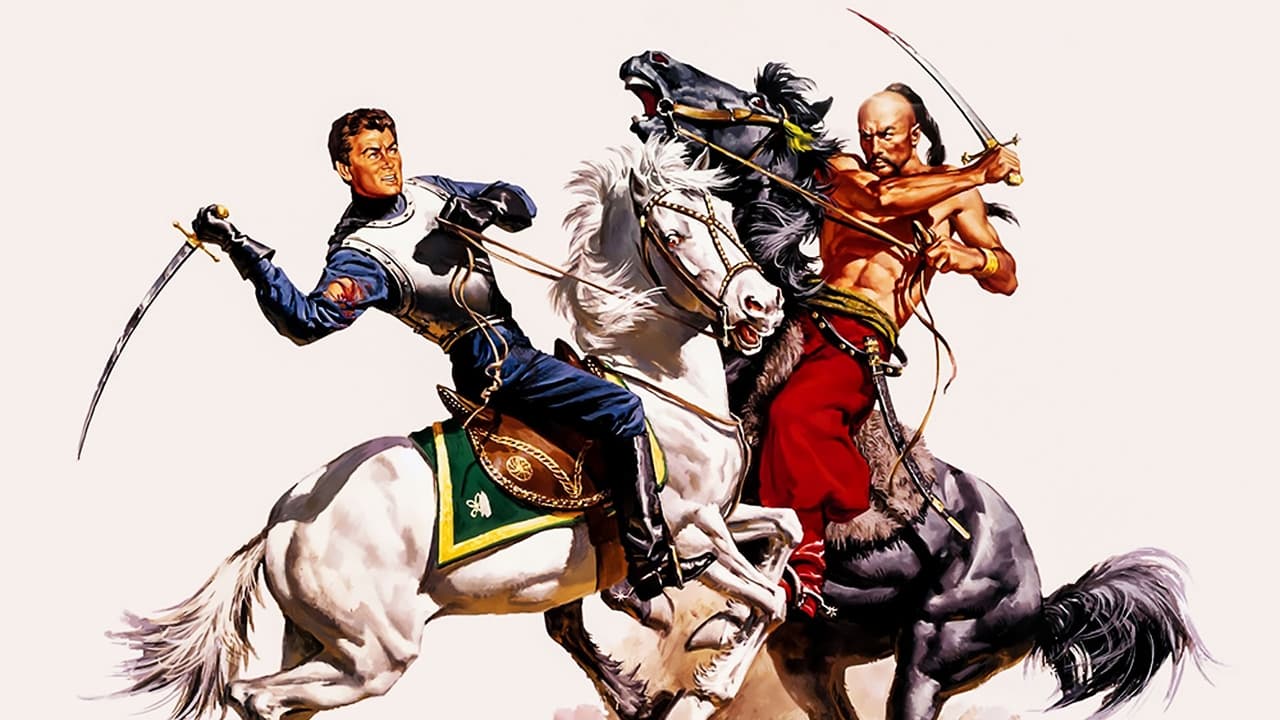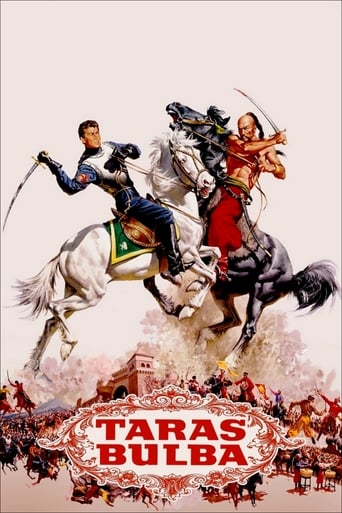

a beautiful film like many from the same period. good adaptation of Gogol's novel, remember of Ukraina's past, great battle scenes and romanticism in great doses. a film who represents the sensitivity of a time, with same ambition to be memorable, with same force of image and cast, a fairy tale who must impress and to be result of same rules who use same ingredients. so, it is not difficult to analyze its sins, errors or mistakes. but it is the wrong way in this case. because the purpose is clear - enjoy the film, admire the costumes and the fights, be part of story , near the anger of father or the foolish love of the son. sure, Yul Brynner is not exactly Taras Bulba . but its job is right and that is only important thing. so, a good movie. maybe for remember the beauty of a lost world/sensitivity.
... View MoreThis movie was quite interesting from the history angle and also had me in anticipation for several of the scenes.Best scenes: --The joining of Cossack brigades as they join forces to attack the Poles. Great cavalry spectacle in a great scenic setting. --The "dual" between Tony Curtis and the big Cossack where they both have to jump the gorge on horse until someone dies. --The Polish battle around the castle near the end.Predictable Script: --The Tony Curtis love angle with the Polish nobility woman.Unpredictable: The punch line between Tony and Yul. nuff said.
... View MoreBorrowing from Gogol the title ,the proper nouns and the son's killing,Jack Lee Thompson's movie is quite entertaining,ideal for a rainy day or after a hard day's work.The first part is the most interesting: the scenes at the university with its sadistic monks -while one of them is flogging the rebel students,the other kneels down and pray- and its "racism" : a lot of Pole Students cannot accept the fact that those primitive savage cossacks study in their school.Curtis was almost emasculated "to prevent him from sullying Pole girls." It sometimes recalls"Romeo and Juliette",which Christine Kaufman's resemblance with Olivia Hussey who would play the part of Juliette six years later reinforces.Yul Brynner is ideally cast as Taras.The 1936 French version ("Tarass Boulba" French spelling)mainly deals with the second part -the siege- and the stories are similar with the same love interest.
... View More"Taras Bulba" is a film by the prolific J. Lee-Thompson, and comes directly after two of his most fondly remembered films "The Guns Of Navarone" and "Cape Fear". Sadly, Thompson is not able to record his third critical hit in a row with "Taras Bulba". While the film has plenty of lively set pieces, stirring music by Franz Waxman, an enjoyable performance by Yul Brynner, and epic widescreen cinematography by Joe MacDonald, it falls short in a handful of other departments. There's a romantic subplot, written in a manner that makes it seem over-ripe and soppy. There's a lack of historical and geographical authenticity which is hard to overlook. And, apart from Brynner as the titular character, too many of the actors are guilty of over-exaggerated performances.The Ukrainian Cossacks, led by the talismanic Taras Bulba (Yul Brynner), fight a battle against Turk invaders. They are assisted in their fight by an army of Poles, led by Prince Grigory (Guy Rolfe). Grigory makes a deal with the Cossacks that if their joint forces win the battle, he will reward them by granting them control of the Steppes of Eastern Europe. But once the battle concludes with victory, the Poles go back on their word and betray their Cossack allies. The Cossacks retreat into the hills, where Taras Bulba contemplates how he will one day have his revenge upon the treacherous Poles. He eventually decides to send his two sons Andrei (Tony Curtis) and Ostap (Perry Lopez) to a Polish university, where it is intended that they learn all there is to know about the ways and customs of their enemy. The plan begins to fall apart when Andrei falls in love with Polish noblewoman Natalia Dubrov (Christine Kaufmann). Andrei is torn between his love for Natalia and his devotion to his own people's cause. Later, when his son's split loyalties become clear, Taras Bulba also finds himself torn between his love for his son and his need to lead the Cossacks against the Poles."Taras Bulba" is a film that sounds great when described, but the actual article doesn't quite live up to its potential. I've already made clear my feelings about the romantic subplot involving Andrei and Natalia, but the over-ripeness and soppiness that plague these scenes are only half of the problem. For the film to reach the devastating tragic climax it seems to be aiming for, Andrei and Natalia's relationship needs to be convincing. We need to feel for them; we need to be fully absorbed in their dilemma of loyalties; we need to be moved by the terrible ironies that bring the film to its supposedly sad conclusion. But we aren't. "Taras Bulba" is ten times more effective when concentrating on spectacular action and epic-scale battles. For these scenes alone it remains a film well worth watching. But it's those attempts to turn it into a tear-jerker an epic for the soft-at-heart, if you like that simply don't work, and pull the film significantly downwards.
... View More